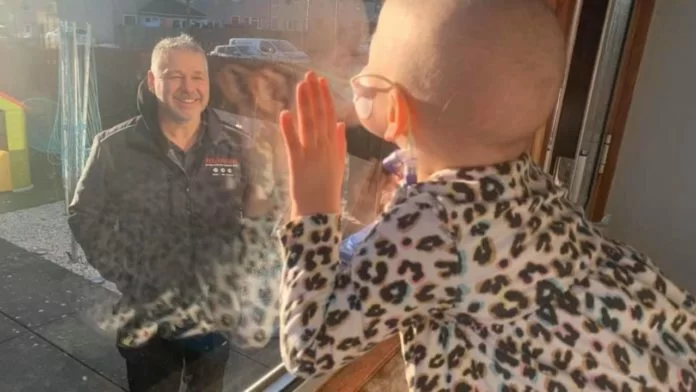March 2020, Covid-19 spreads all over the world: it’s a pandemic. People everywhere are now living in isolation to avoid the risk of infection, a condition well depicted by the photo up here: a young immunosuppressed girl greeting her father through a windowpane. It’s appropriate to say this month nearly drove us mad as a March hare. It turned the tables of every pre-existing game: no matter the past, everything changed in March.
Donald Trump downplays the danger until thousands of Americans get infected
At the beginning of the month, all that everybody in the US was talking about was propaganda for the next presidential elections. We saw Biden and Sanders fight head-to-head for the Democratic Party primaries, while Trump tried to surprise us with a peace agreement between the Taliban and US that actually went nowhere. Then coronavirus arrived. President Trump was in denial at first: a pandemic right in the midst of the presidential race? Too inconvenient! But the events forced him to change his mind and put the Country under lock-down. A little late though: US are currently recording the highest number of confirmed Covid-19 cases around the world. Meanwhile, China’ cases reach zero, and the Country is now focusing on controlling the borders in order to avoid a second wave of infections.
UK Prime Minister gets Covid-19, the virus spares no one
Maybe, in some way, Boris Johnson wanted to enjoy his moment of glory a little longer. Instead, soon after Brexit came into force, coronavirus reached UK. Johnson’s first move was to follow the lead of his American ally and deny the evidence. He then tried the ‘herd immunity’ route, with the infamous words “Many more families are going to lose loved ones”. In the end, the Prime Minister himself was found positive to the virus, and UK was finally put under lock-down.
The pandemic in Europe: priorities rewritten
The European Parliament was busy dealing with the consequences of Great Britain leaving the Union, trying to understand how to fill a 75 billion gap, when Northern Italy was struck by the epidemic. The number of infected people started rising at an exponential rate throughout Europe and rest of the world. Meanwhile, Erdogan opened the Turkish borders to Syrian refugees, launching a human time bomb that the European Border and Coast Guard Agency tried to keep at bay. Along the Greek-Turkish border, refugees were violently sent back and the police corps from the two nations kept fighting. “Greece is Europe’s shield”, EU chief said, and hundreds of thousands people are now trapped in overcrowded camps, living in inhumane conditions. Many words were said, ranging from “It’s the death of modern civilization” to “It’s the death of Europe”, and this humanitarian catastrophe may get even worse when the pandemic arrives. NGOs, volunteers and journalists were also in great danger. Acts of solidarity got criminalised and Amnesty International compiled an alarming report about it. Ironically, now that Coronavirus is a global threat, the world turns to NGOs for help with the sanitary emergency. It’s curious how many things change. Related article: January 2020, all global facts from last month
Syria, a highest-risk situation
Despite the summit for a cease-fire deal between Turkey and Russia at the beginning of the month, people in Idlib started fighting again in no time. The Syrian war is now ten years old. Hospitals were destroyed under the bombings and the health system is collapsing. The situation is incredibly dangerous and the Covid-19 pandemic could lead to a tragedy within the tragedy.
People decide to self-quarantine in Libya
The situation in Libya is similar: years of war brought the health system on the brink of collapse. As soon as the pandemic arrived, people voluntarily quarantined themselves despite Haftar’s bombardments. We can hardly imagine what would happen in these theatres of war and in Yemen if bombs kept falling. UN Secretary-General Antonio Guterres called for an immediate global cease-fire, igniting a spark of hope for Libya as the commander general of the Libyan army decided to stop the airstrikes to fight Covid-19.
Covid-19’s pandemic, a global overview
Ironically, people are talking about the Covid-19’s pandemic in the same way they would talk about a war. Before we make plans on how to deal with the severe economic crisis that will affect the planet in the aftermath, we need to make sure that people have food to eat. This is especially true for the most vulnerable ones, such as migrants and homeless people, but also for all the citizens who are struggling to make the ends meet without a salary. Every country is allocating huge amounts of money to support the population and avoid the explosion of social time bombs. Some governors, like Orban, are putting democracy itself under quarantine and exercising special powers, just like in times of war. The whole world is locked-down and everything is suspended: work, school, even human interactions are now digitalised. Silence in the streets is only broken by the sirens of ambulances passing by. The whole mankind is wrapped around mother nature’s finger, the roles are finally reversed. Nature takes back its space, the environment says thank you.
“We are all in this together”
Human cruelty was raging at the beginning of the month. Now solidarity is taking the spotlight: everybody is trying to help. VIPs, Chinese, Russians, Cubans, Germans, Americans, Italians, Albanians, everybody is lending a helping hand saying: “We are all in this together”. The whole world is in recession. The European Parliament officially suspended the Stability Pact and started discussing the introduction of Coronabond. CEB allocated 1,800 billion Euros to support companies and families, and everybody around the world is looking for a solution, or at least for a way to reduce losses. This could be the hardest global crisis since WWII. All of a sudden, the world looks to science with eyes full of hope, wishing for a second Enlightenment. Just a few months ago, scientists were vilified by climate change sceptics, now they are our only beacon in this long night. People keep visiting WHO’s and health institutions’ websites to get informed, while epidemiologists and virologists are the only voices to be heard in order to understand what Covid-19 is. Drugs are being tested and researchers work tirelessly for a vaccine, a cure to save humanity from this blight. Pope Francis himself did his part to support their efforts: he delivered an extraordinary Urbi et Orbi blessing and the global plenary indulgence. The scenario was surreal: St Peter’s Square was desert under a steady rain. We are all hoping for this pandemic to end as soon as possible, but one thing is certain: nothing will be the same again. Related article: February 2020, all global facts from last month Author: Cecilia Capanna



